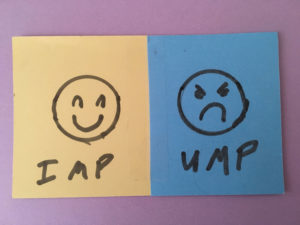Some Reflections on the Creative Process, not Limited to Writing

Imp v. Ump
Imp: I wrote a story. I wrote a story. It’s so much fun. The characters were really talking to each other. I love them and the end is super great.
Ump: Let me take a look at it.
Imp: Sure . . .
Ump: Well, let’s see. You left out a word on the first page.
Imp: Okay . . .
Ump: And on page three you put an apostrophe in its when you shouldn’t have.
Imp: Are you sure?
Ump: Of course, I’m sure. And on page five . . . Imp? Imp? Where’d you go?
Imp? Ump? What are you talking about now? you might ask.
It goes back to the left-brain, right-brain theory of how our mental processes work and the attachment of the label left-brained to someone who tends to be logical and critical and right-brained to someone who tends to be creative and imaginative. I call the former voice in my head my ump and the latter voice my imp.
Definition of ump: the critic, the perfectionist, the logician who lives on the left side of your head, the English teacher of everybody’s nightmares who says, “If you don’t get this absolutely perfect the first time through, you might as well not start at all.”
Definition of imp: the energy, the source, the little kid who lives on the right side of your brain, jumps up and down, waves an imaginary hand to get your attention, and says, “I got an idea. I got an idea.”
In essence, writing isn’t a left-brained activity. It isn’t solely a right-brained activity either. It’s a whole-brained process. To write anything including a novel–maybe especially a novel–you need both your ump and your imp.
But if you let your ump shoot its mouth off too early in the process, you will completely demoralize your imp. And it will quit talking to you altogether and curl up into a small, tight fetal ball.
So when your ump starts saying to you, “Wait! Wait! That’s not exactly the word you need”; or “Is that the correct there, their, they’re?”; or “Why bother? It will never sell”; just say, “Yeah, yeah, yeah, button it, Ump. You’ll get your chance later.” And then, coax your imp to come out and play.
We are not after perfection here. We’re looking for the basics you need to know about your novel before you start to write it, or most of the basics anyway. For example, you might not come up with all the major characters the first time through your cards. Probably you won’t know all of the characters’ names. You might not answer all the questions. It’s not as if you have to show your work to anybody. So relax and enjoy the process.
Telling your ump to cool it goes for drawing the images on your cards, too, if you decide to do them at all. Some of the images on my deck of cards are really messy. And I simply don’t care. At this point, you shouldn’t either.
Join me tomorrow when we’ll talk a bit more about the people of your book.
